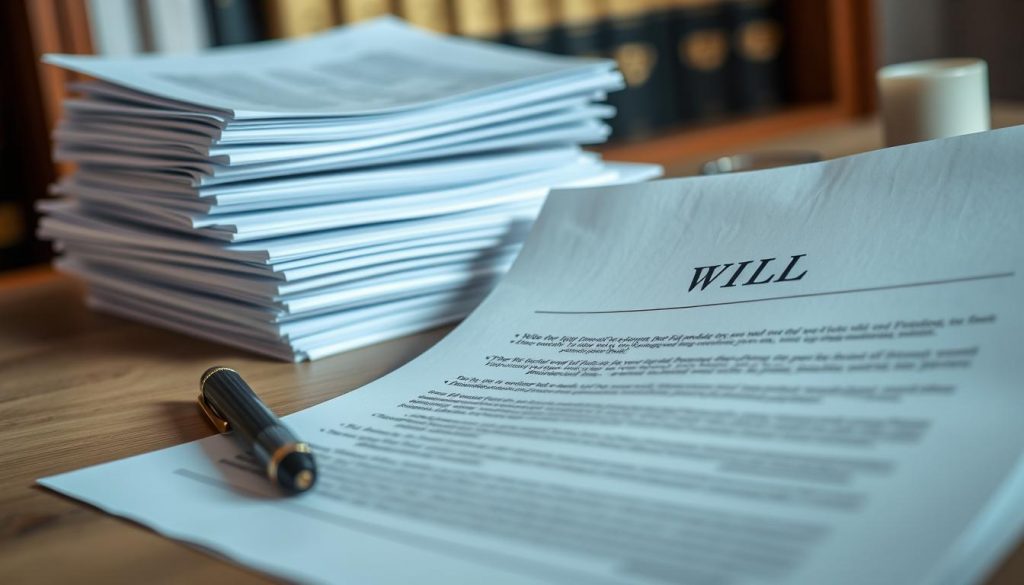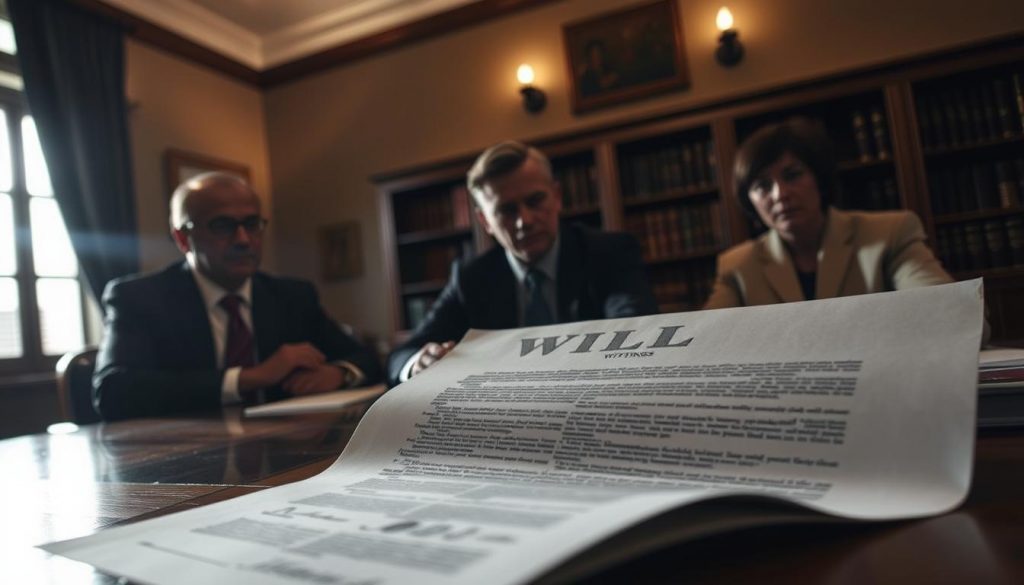Creating a valid will is crucial for ensuring that your assets are distributed according to your wishes after you pass away. In the UK, the law requires that a will be witnessed to prevent disputes and ensure its legitimacy.
Two independent witnesses are required to sign a will, making it a legally binding document. We will guide you through the essential requirements and best practices for witnessing a will, helping you understand the importance of this process.
Understanding the witnessing requirements is vital to avoid any potential disputes or challenges to the will’s validity. We will explore the legal framework and provide clarity on the number of witnesses needed.
Key Takeaways
- Two independent witnesses are required for a will to be valid.
- Witnesses must be independent and not beneficiaries.
- The witnessing process is crucial for the will’s legitimacy.
- A will without proper witnessing can be disputed.
- Understanding the requirements can help prevent future issues.
Understanding the Basic Requirements for a Will
Understanding the fundamental aspects of a will is crucial for ensuring that your estate is distributed according to your wishes. A will is a legally binding document that outlines how your assets should be distributed after your passing.
Definition of a Will
A will, also known as a last will and testament, is a document that specifies how your property, finances, and other possessions should be handled after your death. It allows you to appoint executors to manage your estate and guardians for any minor children. As stated by the Law Society, “A will is not valid unless it is signed by both the testator and two witnesses.”
“A will is not valid unless it is signed by both the testator and two witnesses.”
Importance of Formalities
The formalities surrounding the creation of a will are critical to its validity. The testator must sign the will in the presence of two independent witnesses, or acknowledge their signature in front of them. This ensures that the will is executed without coercion or undue influence. The role of witnesses is to verify that the testator is signing the document voluntarily and is of sound mind.

To comply with will witness requirements, it’s essential to understand that the witnesses must be impartial and not beneficiaries of the will. This requirement is crucial for avoiding conflicts of interest and ensuring the will’s validity.
By following these formalities, you can ensure that your will is executed as intended, providing peace of mind for you and your loved ones.
Legal Framework Governing Wills in the UK
In the UK, the Wills Act 1837 provides the foundational legal framework for the creation and execution of wills. This Act has been the cornerstone of will legislation for over a century, outlining the necessary formalities for a will to be considered valid.
Wills Act 1837 Overview
The Wills Act 1837 is a significant piece of legislation that has shaped the way wills are created and witnessed in the UK. It stipulates that a will must be in writing, signed by the testator (or by someone else in their presence and by their direction), and attested by two or more witnesses. The role of witnesses is crucial as they provide the necessary evidence that the will was signed in their presence, thereby validating its authenticity.
The Act has undergone several amendments since its inception, adapting to societal changes and legal requirements. For instance, the Act originally did not accommodate the witnessing of wills in non-traditional settings or through digital means.
Recent Amendments and Changes
One of the most significant recent amendments to the Wills Act 1837 was made in response to the Covid-19 pandemic. The Wills Act 1837 (Electronic Communications) (Amendment) Order 2020 temporarily allowed for the remote witnessing of wills, enabling testators to sign wills in the presence of witnesses via video link. This measure was introduced as an emergency response to the lockdown restrictions and social distancing measures.
- The temporary provisions allowed for greater flexibility during a period of significant disruption.
- However, these provisions were subject to a sunset clause, meaning they had a limited lifespan and were eventually revoked.
As we move forward, it’s essential to understand the current state of the law regarding will witnessing. While the temporary measures were beneficial during the pandemic, the return to traditional witnessing methods is generally recommended to avoid any potential disputes or challenges to the will’s validity.
“The witnessing of wills is a critical aspect of estate planning, ensuring that the testator’s wishes are carried out as intended. The legal framework surrounding wills must be navigated carefully to avoid any potential pitfalls.”
In conclusion, the legal framework governing wills in the UK is rooted in the Wills Act 1837, with subsequent amendments reflecting changes in society and technology. Understanding these laws and how they apply to individual circumstances is vital for ensuring that one’s will is valid and enforceable.
Witnessing Requirements According to UK Law
To ensure a will is legally binding in the UK, it’s vital to follow the correct witnessing procedure. The witnessing of a will is a critical step that validates the document and confirms that it was signed by the testator (the person making the will) voluntarily.
Minimum Number of Witnesses Required
According to UK law, a will must be signed by two independent witnesses. These witnesses must be present when the testator signs the will, and they must also sign the document in the presence of the testator and each other. This requirement is fundamental to the validity of the will.
The role of these witnesses is not to know the contents of the will but to attest that the testator signed the document voluntarily and appeared to have the necessary capacity to do so. It’s essential that witnesses are impartial and not beneficiaries of the will to avoid any potential conflicts of interest.
Role of Witnesses in Validating a Will
Witnesses play a crucial role in validating a will by confirming the testator’s signature and ensuring that the document was signed without coercion. Their signatures serve as a safeguard against potential disputes or challenges to the will’s validity.
To summarize the witnessing requirements, we have put together a simple table:
| Requirement | Description |
|---|---|
| Number of Witnesses | Two independent witnesses are required. |
| Presence During Signing | Witnesses must be present when the testator signs. |
| Witnesses’ Signatures | Witnesses must sign in the presence of the testator and each other. |
| Witness Independence | Witnesses should not be beneficiaries of the will. |

By following these guidelines, individuals can ensure that their will is executed correctly and that the witnessing process is carried out in accordance with UK law. This not only provides peace of mind but also helps to prevent potential legal issues that could arise in the future.
Who Can Serve as a Witness?
In the UK, the law specifies certain requirements for individuals who can serve as witnesses to a will. When it comes to validating a will, the role of a witness is crucial, and understanding who can serve in this capacity is essential.
Age and Capacity Requirements
To serve as a witness, an individual must be an adult with the mental capacity to understand the significance of their role. This means they must be at least 18 years old and not suffering from any mental disorder that could impair their understanding.
We recommend choosing witnesses who are not only eligible but also likely to be available to testify if needed in the future. It’s essential to select witnesses who are independent and not directly involved in the will’s contents.
Disqualifications for Witnesses
Certain individuals are disqualified from serving as witnesses due to potential conflicts of interest. Beneficiaries or their spouses cannot serve as witnesses, as this could invalidate the gift to the beneficiary or create a conflict of interest.
The following table summarizes the key criteria and disqualifications for witnesses:
| Criteria | Eligibility | Disqualification |
|---|---|---|
| Age | Must be at least 18 years old | Under 18 years old |
| Mental Capacity | Must have the mental capacity to understand their role | Suffering from a mental disorder that impairs understanding |
| Beneficiary or Spouse | Not a beneficiary or their spouse | Beneficiary or their spouse |

By understanding who can serve as a witness and ensuring that the chosen witnesses meet the legal requirements, you can help guarantee the validity of your will.
The Importance of Independent Witnesses
Independent witnesses play a crucial role in ensuring the validity of a will in the UK. Their presence helps to safeguard against potential disputes and ensures that the testator’s wishes are respected.
Avoiding Conflicts of Interest
One of the primary reasons independent witnesses are essential is that they help avoid conflicts of interest. Witnesses should be individuals who have no stake in the will, meaning they should not be beneficiaries or closely related to beneficiaries.
Having independent witnesses can prevent potential challenges to the will. For instance, if a beneficiary acts as a witness, it could lead to complications, as they stand to gain from the will.
Ensuring Validity of the Will
Independent witnesses are vital for validating the testator’s signature. They confirm that the testator signed the will in their presence and appeared to have the necessary capacity and understanding.
To illustrate the importance of independent witnesses, consider the following table:
| Role of Witnesses | Beneficiary as Witness | Independent Witness |
|---|---|---|
| Validation of Signature | Potential Conflict | Unbiased Validation |
| Legal Implications | May Invalidate the Will | Supports Will’s Validity |

We recommend choosing witnesses who are not only independent but also capable of understanding the significance of their role. This ensures that the will is executed according to the testator’s wishes, without any potential legal challenges.
By having independent witnesses, you can ensure that your will is valid and less susceptible to disputes. This provides peace of mind for both you and your beneficiaries.
What Happens If Witness Requirements Are Not Met?
The importance of having the correct number of witnesses on a will cannot be overstated. Failing to adhere to the proper witness rules for wills can lead to significant complications.
When a will is executed without following the correct will execution witnesses guidelines, it can result in the will being deemed invalid. This can cause distress among beneficiaries and lead to lengthy legal battles.
Consequences for the Will’s Validity
If the witness requirements are not met, the will’s validity can be challenged. This can lead to a situation where the will is not recognized by the courts, potentially resulting in the estate being distributed according to the laws of intestacy rather than the deceased’s wishes.
The consequences of an invalid will can be severe, including:
- Delays in the distribution of the estate
- Disputes among beneficiaries
- Potential for legal action against the estate
Potential Legal Challenges
Not adhering to the witness rules for wills can lead to various legal challenges. Beneficiaries or other interested parties may contest the will, leading to costly and time-consuming legal proceedings.
| Legal Challenge | Description | Potential Outcome |
|---|---|---|
| Contesting the Will | Beneficiaries may dispute the will’s validity | Will declared invalid |
| Alleging Undue Influence | Claims that the testator was coerced | Will or specific provisions invalidated |
| Disputes Over Witness Signatures | Challenges to the authenticity of witness signatures | Will’s validity questioned |

To avoid such complications, it is crucial to ensure that the will execution witnesses process is carried out correctly. This includes having the correct number of witnesses on a will and following the proper procedures for witnessing.
How to Properly Execute a Will with Witnesses
The process of signing a will in the presence of witnesses is fundamental to its legal standing. When executing a will, it’s crucial that the testator and witnesses follow the correct procedure to ensure the will’s validity.
Step-by-Step Guide to Execution
To properly execute a will, the following steps must be taken:
- The testator must sign the will in the presence of two witnesses.
- The witnesses must then sign the will in the presence of the testator and each other.
- It’s essential that all parties are present when each signature is made.
We recommend that the witnesses provide their full name, address, and occupation to avoid any potential disputes or challenges to the will’s validity.
Best Practices for Witness Signatures
When it comes to witness signatures, there are several best practices to follow:
- Ensure that the witnesses are impartial and not beneficiaries of the will.
- The witnesses should be adults of sound mind, understanding the significance of their role.
- It’s advisable to choose witnesses who are likely to be available if needed to testify in the future.
By following these guidelines and best practices, you can ensure that your will is executed correctly and that the witnessing process is carried out smoothly, providing clarity and legal standing to your final wishes.
Online Wills and Their Witnessing Requirements
The rise of digital estate planning has led to questions about the validity of online wills and their witnessing requirements. As we explore this topic, it’s crucial to understand the current legal landscape surrounding digital signatures and e-wills.
Validity of Digital Signatures
Digital signatures are becoming increasingly accepted in various legal contexts. However, when it comes to wills, the law remains cautious. Currently, the validity of digital signatures on wills is not universally accepted across the UK. While some jurisdictions have begun to embrace electronic signatures, the traditional requirement for wet signatures (physical signing) remains the norm for wills.
It’s essential to note that:
- The Law Commission has proposed changes to allow for electronic wills and remote witnessing.
- Some courts have shown flexibility in interpreting the existing law to validate wills in exceptional circumstances.
- The use of digital signatures for other legal documents has paved the way for potential future changes in will witnessing.
Current Legislative Position on E-Wills
The current legislative position on e-wills is evolving. During the COVID-19 pandemic, temporary amendments were made to the law to allow for witnessing wills virtually. However, these provisions were temporary and have since been reviewed.
Key points to consider:
- The Law Commission’s proposals for reform include provisions for electronic wills and remote witnessing.
- The UK government is considering these proposals to update the law.
- Until new legislation is passed, the traditional requirements for witnessing wills remain in place.
As the legal landscape continues to evolve, it’s crucial for individuals creating online wills to stay informed about the latest developments. For now, it’s advisable to follow traditional witnessing requirements to ensure the validity of your will.
Recent Trends in Will Witnessing
The COVID-19 pandemic has brought significant changes to the way wills are witnessed in the UK. As we adapted to the challenges posed by the pandemic, the legal framework surrounding will witnessing evolved to accommodate new practices.
Impact of the Pandemic
The pandemic necessitated temporary adjustments to the law to facilitate the execution of wills. One of the key changes was the allowance for remote witnessing of wills, enabling individuals to sign documents while adhering to social distancing measures.
We observed a significant shift towards more flexible witnessing arrangements, ensuring that individuals could still execute their wills safely. This change was crucial in maintaining the continuity of estate planning services during a period of unprecedented disruption.
Remote Witnessing Provisions
The introduction of remote witnessing provisions was a direct response to the challenges posed by the pandemic. Although these provisions were initially temporary, they were later extended to provide continued flexibility.
However, it’s essential to note that these provisions had a deadline and are no longer in effect. For the most current information on the validity of remotely witnessed wills, you can refer to Ashfords’ article on the topic.
| Aspect | Pre-Pandemic | During Pandemic |
|---|---|---|
| Witnessing Method | In-person witnessing required | Remote witnessing allowed temporarily |
| Legal Framework | Traditional witnessing requirements | Temporary amendments to facilitate remote witnessing |
| Impact on Estate Planning | Standard practices | Increased flexibility, ensuring continuity of estate planning |
As shown in the table, the pandemic led to significant changes in will witnessing practices, with a temporary shift towards remote witnessing. Understanding these changes is crucial for ensuring that wills are executed in compliance with the current legal requirements.
Common Misconceptions About Will Witnesses
When it comes to wills, the role of witnesses is frequently misunderstood, leading to a myriad of myths and misconceptions. It’s essential to clarify the role of legal witnesses for will to ensure that the will is valid and executed according to the testator’s wishes.
Misunderstanding the Role of Witnesses
A common misconception is that witnesses need to know the contents of the will. In reality, their role is to verify the testator’s signature, ensuring that the document is signed by the testator in their presence. This misunderstanding can lead to confusion about the requirements for will attestation witnesses.
Witnesses are not required to read or understand the will; their primary responsibility is to confirm the testator’s identity and their willingness to sign the document. This simplifies the process, as witnesses do not need to be privy to the will’s contents.
Myth-busting Common Myths
Several myths surround the witnessing of wills. Let’s debunk some of these:
- Myth: Witnesses must be family members. Reality: Witnesses should be independent and not beneficiaries of the will.
- Myth: One witness is enough. Reality: UK law requires two witnesses for a will to be valid.
- Myth: Witnesses need to know the contents. Reality: Witnesses only need to verify the testator’s signature.
Understanding the witness rules for wills is crucial for ensuring that the will is executed correctly. By clarifying these misconceptions, we can help ensure that wills are properly witnessed, reducing the risk of disputes or challenges to the will’s validity.
| Myth | Reality |
|---|---|
| Witnesses must be family members. | Witnesses should be independent and not beneficiaries. |
| One witness is enough. | UK law requires two witnesses. |
| Witnesses need to know the contents. | Witnesses verify the testator’s signature only. |
Seeking Legal Advice on Will Witnessing
When making a will, it’s essential to ensure that all legal requirements are met, including proper witnessing. We recommend consulting a solicitor to guarantee that your will is executed correctly and is legally binding.
Professional Guidance for Complex Situations
A solicitor can provide valuable guidance on will witness requirements, helping you navigate complex situations. They will ensure that the will is signed and witnessed correctly, reducing the risk of disputes or challenges to the will’s validity.
Understanding how many witnesses for a will are needed and the role of will execution witnesses is crucial. A solicitor will help you comply with UK law, ensuring that your will is valid and reflects your wishes.
Benefits of Expert Advice
Seeking professional guidance on will witnessing can provide peace of mind, knowing that your will is legally binding and will be executed as intended. This expertise is particularly important when dealing with complex family situations or significant assets.


